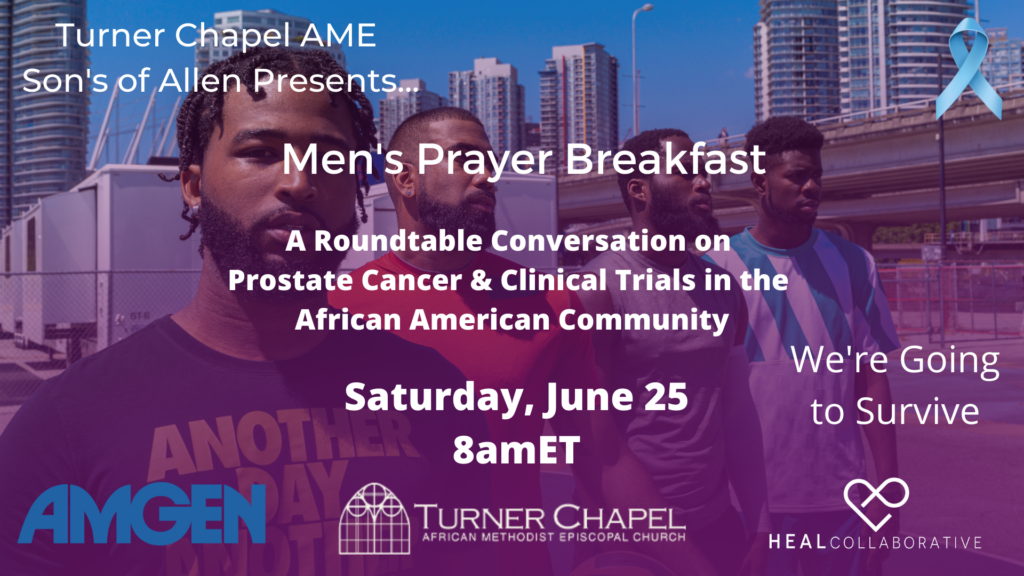
A Community Conversation on Prostate Cancer: The Impact of Clinical Trials in African American Health
June 25, 2022 @ 8:00 am - 9:30 am EDT
June is Men’s Health Month! Come be a part of an important community conversation on African American men’s health.
This program is being hosted by Turner Chapel AME Church Son’s of Allen Men’s Breakfast, held monthly at the church.
To attend the breakfast in person, please contact:
Rev. Leonard Kaigler: [email protected]
*This event will also be lived streamed and you will receive the information in your email confirmation.
June is Men’s Health Month! Come be a part of an important community conversation on African American men’s health.
This program is being hosted by Turner Chapel AME Church Son’s of Allen Men’s Breakfast, held monthly at the church.
To attend the breakfast in person, please contact:
Rev. Leonard Kaigler: [email protected]
*This event will also be lived streamed and you will receive the information in your email confirmation.
EVENT DETAILS:
ADVANCED STAGE PROSTATE CANCER AND DIVERSITY IN CLINICAL TRIALS
How Does Prostate Cancer Affect Black Men?
Prostate cancer makes up about 37% of all cancers in Black men. Around 1 in 6 will be diagnosed with the disease at some point in life. It’s more common in Black men than other racial/ethnic groups.
The disease is also deadlier for Black men. They’re twice as likely to die from prostate cancer compared to men of other races. That’s the biggest racial disparity in deaths from any cancer in the United States.
When it comes to prostate cancer, Black men are also more likely than other races to:
• Be diagnosed at an earlier age
• Have fast-growing, or high-grade, tumor cells
• Have prostate cancer that has spread to other parts of the body (called advanced or metastatic cancer)
Recent data shows how much race is a risk factor for getting prostate cancer:
• According to statistics reported in 2022, over the last 5 years, Black men have been about twice as likely to die from prostate cancer compared to white men.
• The 5-year prostate cancer survival rate for localized cancer is 96 percent for Black men, compared to 98 percent for white men (based on data from 2011 to 2017). Metastatic prostate cancer survival rates are lower.
• Based on data from 2016 to 2018, the lifetime probability that a Black man will die from prostate cancer is 1 in 26, compared to 1 in 44 for a white man.
• Black men develop prostate cancer at a younger age than white men, and the cancer is 44–75 percent more likely to metastasize before diagnosis.
What is advanced prostate cancer?
Advanced prostate cancer means the cancer has spread from the prostate to other parts of the body. It is sometimes called metastatic prostate cancer. It most commonly spreads to lymph nodes in other parts of the body or to the bones. It can also spread to other organs.
You might hear cancer that has spread described as metastatic prostate cancer, secondary prostate cancer, secondaries, metastases or mets. It is still prostate cancer, wherever it is in the body.
Prostate cancer can spread to any part of the body, but most commonly to the bones and lymph nodes. Lymph nodes (sometimes called lymph glands) are part of your lymphatic system, which is part of the body’s immune system. Lymph nodes are found throughout the body including in the pelvic area, near the prostate.
Nearly 100 percent of men (regardless of race) who are diagnosed with prostate cancer at an early stage will survive at least 5 years. Those early stage diagnoses make up 84 percent of prostate cancer cases in Black men. The 5-year survival rate for advanced-stage prostate cancer is also similar in Black and white men, about 30 percent.
However, Black men are more likely to die from cancer of any type because they’re more often diagnosed after the cancer has progressed to an advanced stage that’s difficult to treat.
Diversity in Clinical Trials
If you have advanced prostate cancer, consider joining a clinical trial. There are hundreds of trials looking for men with prostate cancer to test new therapies—especially Black men, who have been underrepresented in research—and it can give you early access to the newest drugs and technologies. For some, clinical trials end up being lifesaving. Ask your doctors about trials they know of in your area or search for one yourself at clinicaltrials.gov.
PANELISTS:
Rev. Leonard Kaigler, Ministry Leader, Turner Chapel AME Men’s Ministry
Lawrence Sanders, MD, Internal Medicine, Physician Advisor for Clinical Documentation improvement and care management, Grady Health System and Medical Director/Chief Medical Officer, HEAL Collaborative
Shafiq A. Khan, PhD Former Director Center for Cancer Research and Therapeutic Development at Clark Atlanta University
Gregory Bolder, Co-Founder and CEO, Comprehensive Men’s Health Initiative
The Honorable Virgil Fludd, Former Georgia State Representative and Prostate Cancer Survivor
THIS EVENT IS SPONSORED BY:

